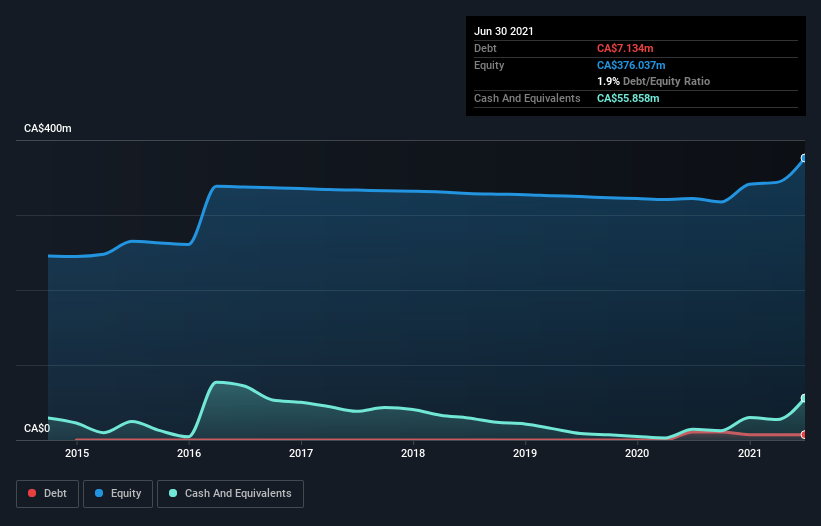Is Fission Uranium (TSE:FCU) Weighed On By Its Debt Load?
The external fund manager backed by Berkshire Hathaway's Charlie Munger, Li Lu, makes no bones about it when he says 'The biggest investment risk is not the volatility of prices, but whether you will suffer a permanent loss of capital.' So it seems the smart money knows that debt - which is usually involved in bankruptcies - is a very important factor, when you assess how risky a company is. As with many other companies Fission Uranium Corp. (TSE:FCU) makes use of debt. But the real question is whether this debt is making the company risky.
What Risk Does Debt Bring?
Debt is a tool to help businesses grow, but if a business is incapable of paying off its lenders, then it exists at their mercy. In the worst case scenario, a company can go bankrupt if it cannot pay its creditors. While that is not too common, we often do see indebted companies permanently diluting shareholders because lenders force them to raise capital at a distressed price. Of course, debt can be an important tool in businesses, particularly capital heavy businesses. The first step when considering a company's debt levels is to consider its cash and debt together.
See our latest analysis for Fission Uranium
What Is Fission Uranium's Net Debt?
You can click the graphic below for the historical numbers, but it shows that Fission Uranium had CA$7.13m of debt in June 2021, down from CA$10.7m, one year before. However, its balance sheet shows it holds CA$55.9m in cash, so it actually has CA$48.7m net cash.
How Healthy Is Fission Uranium's Balance Sheet?
Zooming in on the latest balance sheet data, we can see that Fission Uranium had liabilities of CA$2.77m due within 12 months and liabilities of CA$9.16m due beyond that. Offsetting these obligations, it had cash of CA$55.9m as well as receivables valued at CA$397.9k due within 12 months. So it can boast CA$44.3m more liquid assets than total liabilities.
This surplus suggests that Fission Uranium has a conservative balance sheet, and could probably eliminate its debt without much difficulty. Succinctly put, Fission Uranium boasts net cash, so it's fair to say it does not have a heavy debt load! There's no doubt that we learn most about debt from the balance sheet. But it is future earnings, more than anything, that will determine Fission Uranium's ability to maintain a healthy balance sheet going forward. So if you want to see what the professionals think, you might find this free report on analyst profit forecasts to be interesting.
Given its lack of meaningful operating revenue, Fission Uranium shareholders no doubt hope it can fund itself until it can sell some combustibles.
So How Risky Is Fission Uranium?
We have no doubt that loss making companies are, in general, riskier than profitable ones. And we do note that Fission Uranium had an earnings before interest and tax (EBIT) loss, over the last year. Indeed, in that time it burnt through CA$13m of cash and made a loss of CA$11m. Given it only has net cash of CA$48.7m, the company may need to raise more capital if it doesn't reach break-even soon. Overall, its balance sheet doesn't seem overly risky, at the moment, but we're always cautious until we see the positive free cash flow. The balance sheet is clearly the area to focus on when you are analysing debt. But ultimately, every company can contain risks that exist outside of the balance sheet. These risks can be hard to spot. Every company has them, and we've spotted 4 warning signs for Fission Uranium (of which 1 doesn't sit too well with us!) you should know about.
If you're interested in investing in businesses that can grow profits without the burden of debt, then check out this free list of growing businesses that have net cash on the balance sheet.
This article by Simply Wall St is general in nature. We provide commentary based on historical data and analyst forecasts only using an unbiased methodology and our articles are not intended to be financial advice. It does not constitute a recommendation to buy or sell any stock, and does not take account of your objectives, or your financial situation. We aim to bring you long-term focused analysis driven by fundamental data. Note that our analysis may not factor in the latest price-sensitive company announcements or qualitative material. Simply Wall St has no position in any stocks mentioned.
Have feedback on this article? Concerned about the content? Get in touch with us directly. Alternatively, email editorial-team (at) simplywallst.com.

 Yahoo Finance
Yahoo Finance 
